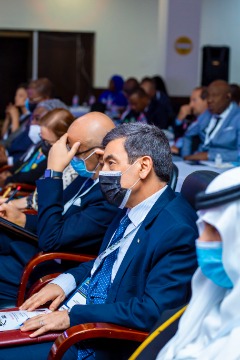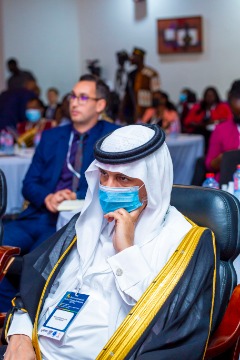7TH GHANA INTERNATIONAL TRADE & FINANCE CONFERENCE – GITFiC 2023
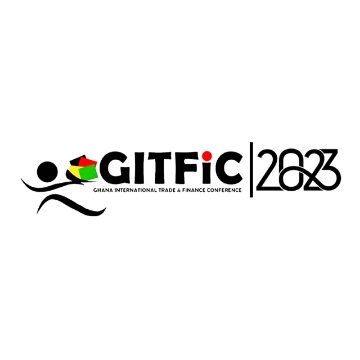
DAY ONE
Topic: Finance under the theme; Sovereign Economic Vulnerabilities; An Endorsement for a Single Currency for Africa – with ECOWAS as a case study.
(Regional Central Banks are expected to lead in this conversation)
Regional economic communities, RECs, in Africa, have been struggling with the creation of common currencies since their inceptions. For the Economic Community of West African States, ECOWAS, the struggle commenced since 2003, when the Eco was scheduled to circulate. We have witnessed several postponements since then, the latest being from the set date of 2020 to 2027. All agents desire a developed, prosperous and united Africa. But if asked about using a common currency, many decision makers run into uncertainties and ambiguities. For many policy makers, the decision of whether to accept a common currency is a big irritation and an embarrassing nuisance. Academics tend to be intellectually dishonest about the importance of a common currency in an economic community. Some display remarkable niceties and dexterity via, the near impossibility and incongruence of a common currency in most African RECs. On the other hand, others, are quick to go into the exegesis of economic integration in, stating, inter alia, that economic unions tend to ensure the free flow of human and material resources among cooperating nations, and hence, countries uniting tend to benefit. But this is intellectually dishonest, because only when common money is instituted can there be the kind of benefits everyone is talking about regarding economic union and cooperation among nations. The Euro and the United States Dollar are success stories.
Common currency is a necessary condition for an economic community to exist but not sufficient. It is sufficient when there is political unification. This fact that common currency is only a necessary condition for an economic community to operate gives some flexibility for the African Union and its constituent RECs to establish a functional common currency that will kick start a rather uninspiring, invariant economic fortune, befalling her since the colonizing countries of Europe departed the shores of Africa more than fifty years ago. A common currency is itself a signal to a promising and prosperous economic union, bringing to fruition the role money plays in traditional individual economies throughout the world and throughout time. But the new opportunities in the expanded multistate economy bring added platforms for money to play an accelerated and deepening function in not just banking and financial development but also in the overall living of the unionizing people.
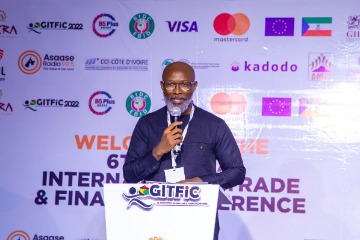
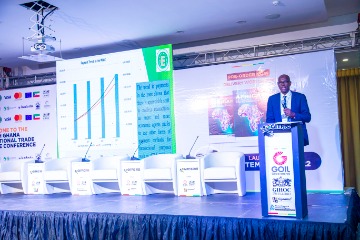
We at the Ghana International Trade & Finance Conference – GITFiC have up our advocacy over the years on a single currency in Africa as an enabler of a safe and efficient financial environment, which has a direct correlation on national payment procedure. This is relevance for monetary policy, financial stability and overall economic development interests. Central banks monitor developments in the payment systems to assess their impact on the demand for money, monetary policy and financial system stability. Central banks can advise on payment related financial policy and act as effective catalysts, together with private sector organizations, in initiating, promoting and contributing to Cross Border Trade. The achievement of a single currency for Africa will eliminate Payment & Settlement barriers (currency convertibility hurdles plus or minus) and bring the needed reforms in Africa’s financial sector.
The 7th Ghana International Trade and Finance Conference (GITFiC) 2023 will mount a spirited advocacy on Policy formulators and implementers to commence with a SINGLE TRADE CURRENCY and thereafter focus on the role played by financial institutions in Africa in achieving a single continental currency. Hopefully, this phrase will cut the chase. The conference will put development issues in the context of the optimum currency area in order to determine the extent a common currency will be beneficial for the African continent.
THE ROLE OF THE FINANCIAL SECTORS
Africa’s currency fragmentation remains distasteful and obstructs reforms and progress. The 7th conference will highlight the leadership or catalyst role by providing policy directions, preparing roadmaps in consultation with stakeholders, and guiding National and Regional discussion to close all bottlenecks and hindrances in achieving this. The need to identify a name, own the IP and ‘’coheres’’ central banks to implement, is now or never in lieu of the implementation of a Continental Free Trade Agreement. There are several existing enabling structures on the African continent to facilitate the adaptation and implement a single trading currency for the continent and examples are;
1. All regional blocs already have vibrant and functional regional central banks
2. The continent already has regional trading blocs
3. The continent already has a central bank association
4. The continent already have an effective, efficient and functional union ie; AU
5. The continent already has several regional financial institutions and mechanisms such as the African Development Bank, ECOWAS Bank, Trade & Development Bank, AFREXIMBANK etc…
In lieu of these and several other structural infrastructures, a single trading currency should be now or never; we at GITFiC so believe in.
DAY TWO- FIRST PANEL
Topic: Trade and Healthy Investment under the theme; Actualising Africa’s Industralisation Agenda in the era of the AfCFTA; The Role of Africa’s Small and Medium Scale Enterprises – with Ghana as a case study.
(The AU is expected to lead this conversation)
Small-and-medium size Scale enterprises (SMEs) are crucial towards actualizing Africa’s Industrialization Agenda in the era of the AfCFTA for inclusive socio-economic development and growth. This is because SMEs are generating work opportunities, income, and wealth creation, and thereby, enhancing poverty reduction. SMEs account for approximately 80% of jobs in Africa and this makes SMEs a significant mechanism for socio-economic growth. Within Sub-Saharan Africa, there are approximately 44 million SMEs. In addition, the African Continental Free Trade Area (AfCFTA) promises to expand access to regional and continental-wide export markets for SMEs. Further to this, the Sustainable Development Goals and the African Union acknowledges that Africa’s drivers of economic growth and long-term sustainability for emerging markets are dependent on the potential of the effective development of the SME business framework. The presence of SMEs in all sectors of Africa’s economy is signifying the vital role of the African Continental Free Trade Area (AfCFTA) in steering the socio-economic development and growth of the African continent.
In Africa, SMEs are essentially contributing towards job creation and employment for a large populace. For example, 80-90 percent of the population in African countries such as Ghana, South Africa Ethiopia, Ivory Coast and Kenya are employed within SMEs which represents 50-70 percent of the official GDP; lacks effective payment, regulatory and institutional frameworks to support cross border digital trade and fragmented regulatory frameworks and this continues to limit the potential to unlock the benefits of intra-African trade. In addition, SMEs are attributed and accredited for identifying and creating new markets and serving as the foundation for new companies. Through the AfCFTA, informal and micro and small enterprises will be integrated into the continental markets breaking the barriers these businesses constantly encounter as they try to penetrate more advanced regional and overseas markets.
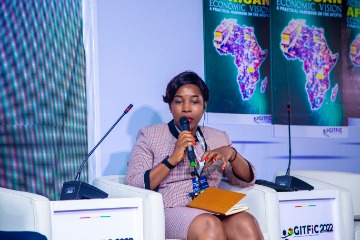
The AfCFTA is expected to enhance competitiveness, promote industrial development through diversification and regional value chain development, and foster sustainable socio-economic development and structural transformation. Small and medium-sized enterprises will benefit from easier means to supply inputs to larger regional companies, who then export to overseas markets. However, despite the positive influence towards the development of the Africa continent, SMEs are still facing tremendous and restrictive obstacles that are impeding their long-term survival and contribution to the development of Africa. Informal cross-border trade in Ghana, Kenya, Tanzania, South Africa and Ethiopia which represents 50-70 percent of the official GDP, lacks effective payment, regulatory and institutional frameworks to support cross border digital trade and fragmented regulatory frameworks and this continues to limit the potential to unlock the benefits of intra-African trade. To enable the implementation of AfCFTA, an evaluation of opportunities and bottlenecks for an effective cross border trade in the sub-regions are fundamental. Strengthening and consolidating Africa’s SMEs has a huge potential of driving every economy and also serve as an essential step for economic recovery and inclusivity given the impact of COVID-19 on businesses and economies.
Cross Border Trade is anticipated to grow and expand rapidly in lieu of the AfCFTA in the coming years and Africa’s SME is expected to drive this success. Africa’s Industrialization agenda is also targeted at facilitating the improvements in technology and the emergence of new digital products and business models. SMEs grow and expand to become industries therefore, if the growth of Africa’s SMEs becomes a deliberate agenda, Africa will be bound to achieve its massive industrial growth targets.
The 7th Ghana International Trade and Finance Conference (GITFiC) 2023 will entail among others an assessment on the roles SMEs, governments and private sector will play in achieving the goals set for the various AfCFTA implementation phases. We at the Ghana International Trade & Finance Conference – GITFiC believe that Africa’s industrialization is a catalyst to a successful intra African Trade hence the AfCFTA.
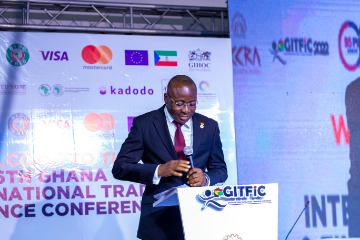
Governments on the African Continent have no choice than to be intentional in investing heavily to empower SMEs to become industries to drive this agenda. The 7th Ghana International Trade and Finance Conference (GITFiC) 2023 aims to provide an up-to-date understanding and escalate this conversation on the effectiveness and efficiency of investing in Africa’s SMEs and Industries for Africa’s prosperity.
Africa’s policy-makers and legislative mechanisms should embed Investment, SMEs and Industrialization sufficiently in its agenda and hold sector ministers and ministries to account on a year on year basis. This, we at GITFiC believe is a surest bet to Africa’s growth and prosperity. Related to this is our understanding that Cross Border Trade have always present an opportunity for economic growth in the modern-day of Africa’s economy.
An Industralised Africa will translate into a quicker recovery from the COVID-19 pandemic which has crippled several global economies leaving Africa much wounded. The 7th Ghana International Trade and Finance Conference (GITFiC) 2023, therefore, seeks to update the evidence base of what is currently available in terms of data on digital trade, and in doing so, identify potential options for estimating the value of Africa’s Industralisation agenda, Investments and Cross Border Trade given the current data gaps.
What the AfCFTA means for Small and Medium Scale Enterprises;
1. Better access to trading finance
2. Growth through the AfCFTA means being able to enter new markets
3. Incentive to increase manufacturing through demand on the African market and will also create more job opportunities
4. Simplifying the purchase of raw materials from other African countries. This means that it will cost less to produce/manufacture certain goods and products. The AfCFTA will also open opportunities to set up assembly firms in other African countries
5. The AfCFTA will allow larger firms to partner with SMEs to process raw materials, train them in best practices whiles transferring technology in the process
6. As the level of trade between African countries goes up, SMEs and traders will make more money and boost livelihoods.
DAY TWO – SECOND PANEL
Topic: A Review of the Implementation of the AfCFTA; Towards an African Centered AfCFTA Disputes Settlement Protocol.
Chief Trade Negotiators from Africa are anticipated to lead this discussion.
Trade Protocols presents a unique opportunity for African states to disentangle a complex, often- overlapping and fractured system of African related international trade agreements. This includes the various trade related agreements developed by regional blocs such as ECOWAS, COMESA, SADC and several Intra-African Bilateral Trade Agreements between African countries and countries outside the continent. Over the past decade there have been strong efforts at both the national and regional level towards achieving harmonized trade regulatory framework. The most recent attempt towards the development of a harmonized model document relating to trade is the African Continental Free Trade Area (AfCFTA).
The 7th Ghana International Trade and Finance Conference 2023 aims to measure the Acceptability and Adaptation Level of the AfCFTA on the African Continent two years after an overall Implementation of the 1st Phase towards an African Centered AfCFTA Disputes Settlement Protocol. Dispute settlement systems play a key role in international economic integration. An active, independent, efficient and reliable Dispute Settlement Mechanism (DSM) is essential to not only settling disputes between the state parties in upholding a rules-based regime; but also, critical to developing relevant jurisprudence that will guide the single market economy objective of the constituent trade agreement. In the AfCFTA context, the DSM will also be important for the purpose of interpreting areas of overlap or conflict with other former judicial orders in Africa. Dispute settlement is recognised as a central element in providing security and predictability to the regional trading system under the AfCFTA.
The AfCFTA Protocol provides unrivalled opportunity for trade ministers to come to a consensus on the core principles of international trade that should be reflective in the agreement on matters such as issues of trade in goods, issues of trade in service and dispute settlement mechanisms. It is clear that the AfCFTA is an apt response to the reluctance of companies to invest in small, fragmented, and uncompetitive national markets in Africa. Such a large and attractive market opens opportunities in many areas, not least, public-private partnerships in investments in the infrastructure and logistics that will connect African economies.
The 7th Ghana International Trade and Finance Conference 2023 will be a safe landing conference to analysis the AfCFTA-Dispute Settlement Mechanism which will be seen as a window of opportunity that can be utilized to amend the dispute protocol in order to reflect the judicial attitude of African states towards trade dispute settlement, while also expanding the pool of actors to include private businesses who are the primary users of the system. Understanding trade protocols under the African Continental Free Trade Area (AfCFTA) is important, given its increasing prominence on the continent. Given a 2year on the implementation of the African Continental Free Trade Area of phase 1, it is important for policy-makers and legislators to review successes chalked cum hurdles that sufficiently addresses the challenges associated with trade protocols. Related to this is the understanding that the adaptation of AfCFTA presents an opportunity for economic growth in the modern-day economy.
Important Resource Pages to visit:
https://gitfic.com/past-conferences/
https://gitfic.com/regional-seminars-on-afcfta/ (Our Regional Seminars on the AfCFTA)
https://gitfic.com/media-press-conferences/
https://gitfic.com/trade-missions-programs/
https://gitfic.com/monthly-research-reports/ (Our Monthly Research Reports)
https://gitfic.com/press-releases/ (A few selected media reportage since 2017)

